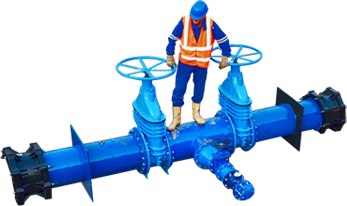Pipeline Systems Division
The PSD strives to promote technological progress and international co-operation in the area of Pipeline Systems engineering.

About
In March 2000, ASME International established the Pipeline Systems Subdivision (PSD), within ASME's Materials and Structures Group, to draw together worldwide interest in pipeline technology. As of March 2003, PSD has been elevated to full division status and is now the Pipeline Systems Division.
Pipelines are used throughout the world for sundry purposes, chief of which is the safe and economic transportation of energy products and water supplies. The multi-billion dollar pipeline industry employs many thousands of people in the design, construction, operation and maintenance of facilities.
The impetus to form the PSD stemmed from a strong desire to represent pipeline community and from several highly successful international pipeline conferences held in Calgary, Alberta, Canada. These conferences have enjoyed strong support from the industry, government, regulatory agencies, research and academic establishments, pipeline and other associations. The International Pipeline Conference and Exhibition is held in Calgary in September in even years.
Besides using conferences as a means of disseminating state of the art information on such topics as, Pipeline System Integrity, Design, Construction, Code/Standards/Regulations, Automation, Operations, Maintenance as well as Management and Environmental issues, the objectives of the Division are to encourage the interaction and professional development of its international membership. Planned activities include technical meetings, conferences, seminars/workshops and short courses as well as web-based training and publications as well as expositions.
Objectives:
Promote technological progress and international co-operation in the area of Pipeline Systems engineering.
Support of education and timely, in-depth exchange of technical information among researchers and engineers.
Provide strong leadership and liaison, including the promotion of technical activities and conferences, within ASME and with other international organizations.
Provide a public advocacy role for matters related to pipelines, in conformance with the ASME Constitution, By-Laws, and Policies.
Promote the development of Codes and Standards related to pipeline system design and safety
Scope:
Pipeline Automation and Measurement:
SCADA, Communications, Control Devices, Systems Control, Sensor Technology, Hydraulic Simulations, Leak Detection, Measurement and Metering
Rotating Equipment:
Pumps, Compressors, Drivers, Seals, Bearings, Pulsation, Vibration, Noise, Emissions, Coolers, Maintenance Planning
Permafrost Engineering, Geotechnics and Heat Transfer:
Frost Heave, Ground Movements, Earthquake Response, Slope Stability, Geotextiles, Piling, Arctic Pipelines, Insulated Lines, Pipe in Pipe lines
Offshore Issues:
Deep Water Pipelines, Reliability Based Design, Fluid-Solid-Soil Interactions, Free Spanning, Pipe Soil Interaction, Computational Methods, Hydrodynamic Forces, Vortex Shedding, Marine Risers, Multi Phase Flow, Hydrates, Robotics/Remote Control Valves
Materials Science:
Fatigue/Fracture Control, Corrosion Defect Assessment, Inspection (internal and external), Non Destructive Testing, Repairs, Welding and Joining, Cathodic Protection, Coatings, Inhibitors
GIS/Database Development:
Records Management, Database Design, Satellite Imaging and Remote Sensing, Geomatics, GPS applications
Environmental Issues:
Route Selection, Remediation, Reclamation, Mitigation, Abandonment, Land Issues, Hydrotesting, Regulatory and Community Issues, Pubic Participation, Environmental Impact Assessments
Design and Construction:
Materials Selection, Codes and Standards, Limit States Design, System Hydraulic Design, Station Design, Mechanical Design of Components, Quality Assurance, Welding Technology, Start Up and Commissioning
Pipeline Integrity:
Reliability Centred Maintenance, Innovative Detection Methods, Pigging, Stress Corrosion Cracking, Hydrogen Induced Cracking
Codes & Standards
https://www.asme.org/codes-standards/find-codes-standards?search=true&query=pipeline
Non-ASME Related Codes
American Petroleum Institute (API) Pipeline Standards Technical Interpretations - Available at http://www.techstreet.com/cgi-bin/browse?publisher_id=25
Leadership
Bose Babu Nallapaneni
Chair | July 2024 - June 2025
Rafael Mora
Vice Chair | July 2023 - June 2024
Erika Santana
Treasurer | July 2023 - June 2024
Tran Mah-Paulson
Secretary | July 2023 - June 2024
Jennifer Klementis
Member | July 2024 - June 2025
Husain M. Muslim
Member | July 2024 - June 2025
Danny Aronson
Immediate Past Chair | July 2024 - June 2025
Kim Miceli
Staff Contact | May 2015 - OPEN
Jamie Hart
Staff Contact | August 2019 - OPEN
Events
- PRCI - upcoming events
- 2025 YPP USA Symposium Registration Live for May 29, 2025, Houston, TX
- Banff Pipeline Workshop 2025 for April 7-10, Banff, Canada